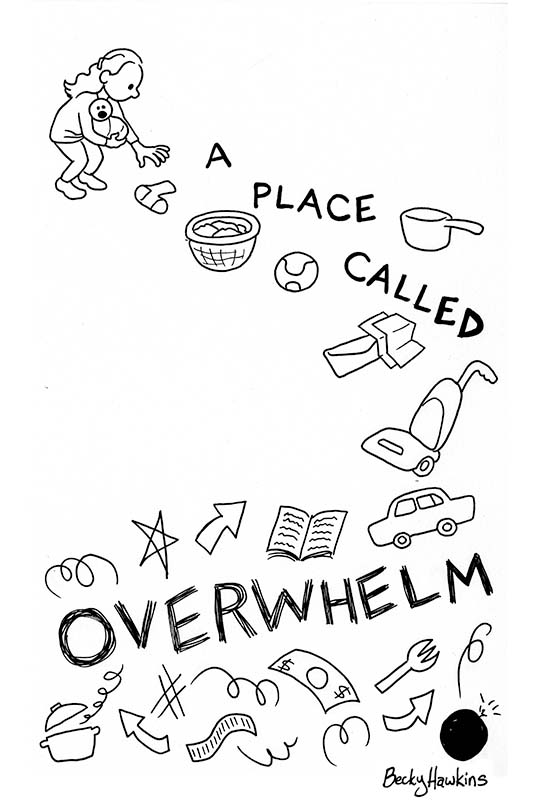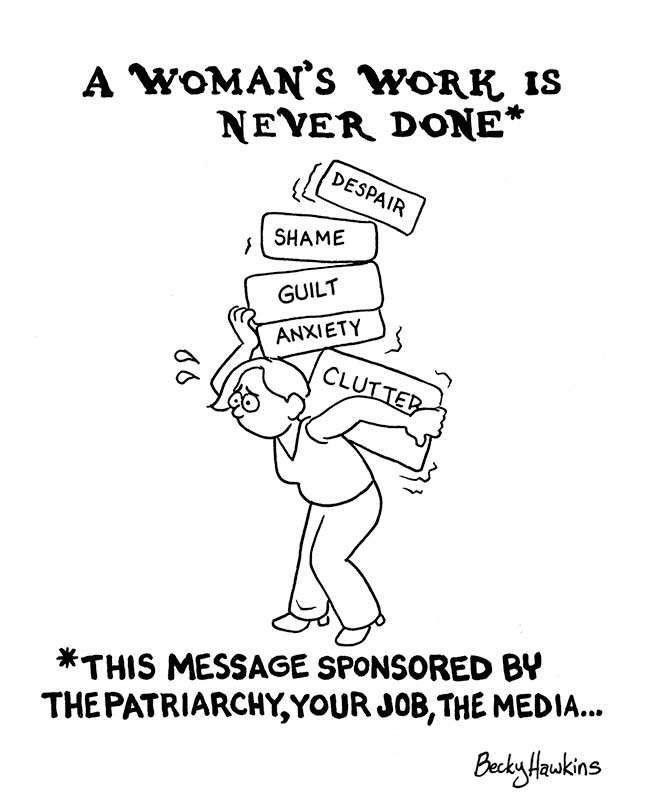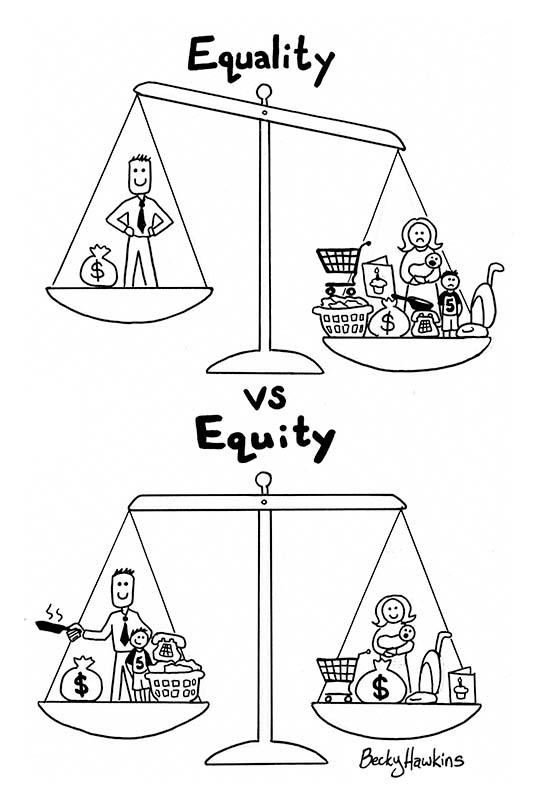Emotional Labor showed up in Justine and Jordan’s relationship the moment they started their journey together. After living together, first as college roommates then lovers for seven years, they married and started a family. Two children and twenty years of sharing space later, Justine called me for help to de-clutter and organize her home, her life, her family, her kids.
Within 15 minutes of our call, Justine repeated the now familiar lament: “I just can’t seem to do it all.” To which I replied, “No one can, Justine.”
In my 13 years as the owner of a professional organizing, decluttering, and let’s get you out of the mess company… I didn’t even have to ask Justine what she meant by “all” (as in, I can’t do it all). And that is because Justine’s “all” is an extraordinarily long list of “to dos” when it comes to household management and family togetherness, also known as “women’s work.”
- pets to the vet
- stablishing/maintaining family communications;
- hiring the housekeeper, nanny, and music teacher;
- care-taking elder parents and in-laws, and disabled family members;
- making sure there’s wrapping paper and tape, ketchup and mustard, etc.;
- and making endless lists.
- And don’t forget laundry,
- meal prep,
- cleaning and organizing,
- lawn and garden care;
- everything school-related (permission slips, backpacks, homework, car-pools);
- scheduling and planning: vacations, appointments, family visits, childcare, extra-curricular activities;
- and of course, gifts for family, in-laws, new babies, birthdays.
Are you exhausted yet? Justine is.
I ask because this partial list of the physical tasks included under the rubric of “household management” doesn’t include the tasks that comprise the “other” side the work which is, quite possibly, an even longer and more onerous one. And, ironically, the list is mostly invisible.
I’m talking about the work we call “emotional labor,” defined as the unseen, unnoticed, unwaged, unwritten work women do in the home and in the paid workforce. Largely invisible, the mental load of emotional labor weighs heavily on the shoulders of women yet the value is huge. It is the collective wisdom, experience, processes, and facts that provide a solid foundation for a profession to continue on and to improve. Valued as a profession or not, the collective wisdom of women in the home is a heavy body of knowledge. Where does this knowledge come from? How we are raised, for sure. We have memories of our mothers doing particular forms of housework and the like. Our own hands-on experience is key, too. We are in the constant state of acquiring knowledge. It connects to both our long-term memory and our working memory. We pull out myriad specialized pieces of knowledge when we need to do such things as unstick the garbage disposer or buy the right size pants for a slightly hefty seven-year-old.
A Life of Lists and Responsibility
And so that task list grows, too. Living with a family requires remembering who likes what, and managing everything school-related (permission slips, backpacks, homework, car-pools, masking protocol).
But wait! There’s more:
- Sending around the sympathy/birthday cards at work
- Filling the picture frames
- Handing out tissues, band-aids, snacks
- Problem-solving [internal and external]
- Listening
- Making sure there’s wrapping paper and tape, ketchup and mustard
- Making lists
- Noticing what needs to be done
- Delegate work at home/make sure it gets done
- Offering advice, lending an ear
- Labors of love
And these task lists grow and change over time. Emotional Labor: Why A Woman’s Work is Never Done and What To Do About It includes the “Emotional Labor Life-Cycle (ELLC),” a pages-long rendering of hundreds of life-cycle and life-style changes any of us will likely experience in our lifetime.
Emotional labor shows up in every relationship with intimate friends or family members. When it comes to the work of Emotional Labor, ownership of the task lists above began somewhere, usually at the start of a new relationship. From the ELLC we see the bud of emotional labor start with that first kiss… the bliss of that kiss is to be documented and remembered, and deposited into the first stage of the ELLC. Evidence of that event will be kept and treasured and whipped out as needed.
For Justine, it was from that first kiss to college, setting up house, creating new traditions, connecting families, making babies, packing and moving to making new connections on the job, and with other kids’ parents. We women are single and married and queer and poly. We have parents and aunties and people we love and who rely upon us for one thing or another, or we rely upon them. Everyone relied on Justine.
The connections among us are the cornerstone of emotional labor. The patching and piecing and joining our lives with friends, family, co-workers is integral to who we are human beings. We rely on each other to help us get through life. Maintaining these relationships can be fun, or satisfying, or a real burden — and for sure it’s a whole lot of work.
Work Load Responsibility
Justine’s overwhelmed feelings have two components. First, the work-load itself – and there’s a lot of it! From the lists above not a single element of the work requires that one have a particular body part (e.g., a vagina!) in order to perform the work.
Second, Justine feels awfully alone in a household that includes another adult (Jordan) and two teenagers (Julie and Joe). As Justine explained, “I’m ‘it’ around here – the buck stops with me. I’m tracking and planning and getting everyone on board to clean the house, the help with dinner, help with the trash, help getting out the holiday cards. All of it. It’s all on me and I’m really, really tired. When did knowing where to find the super-glue become my job?”
While emotional labor is often the glue that holds a family and their values together, I recommend spreading the wealth and creating a more equitable homelife in three meaningful ways. First, the adults in the household will make a list of ALL the work they do toward the management of the home – no filters, write in all down. Second, compare lists and start a new conversation that revolves around who’s doing what at home. Finally, in the spirit of what I call “radical delegation,” the person with the longest list decides which tasks they no longer want to manage, and the person with the shortest list takes them on regardless if they’re “good” at it. Emotional labor shows up in every relationship and in every personal interaction. Since it’s usually women who are tasked with (or are best at!) doing, well, most everything, having them “do it all” doesn’t promote equity and it’s really not fair.
Consequently, it is time for a radical re-thinking of how to create equity at home.
March 2022
Regina is a featured speaker and educator on issues ranging from productivity, hoarding, and women’s leadership. This past October, Regina published her third book, Emotional Labor: Why A Woman’s Work is Never Done and What To Do About It. She earned her Ph.D. in history from the University of Southern California, writing a dissertation on interracial marriages between Japanese women and American GIs after World War 2.
For fun she plays golf and tennis, and writes goofy songs about clutter.
[hubspot type=form portal=21259120 id=cfe2f52e-7b27-4022-adcd-dd02bb344cfd]



